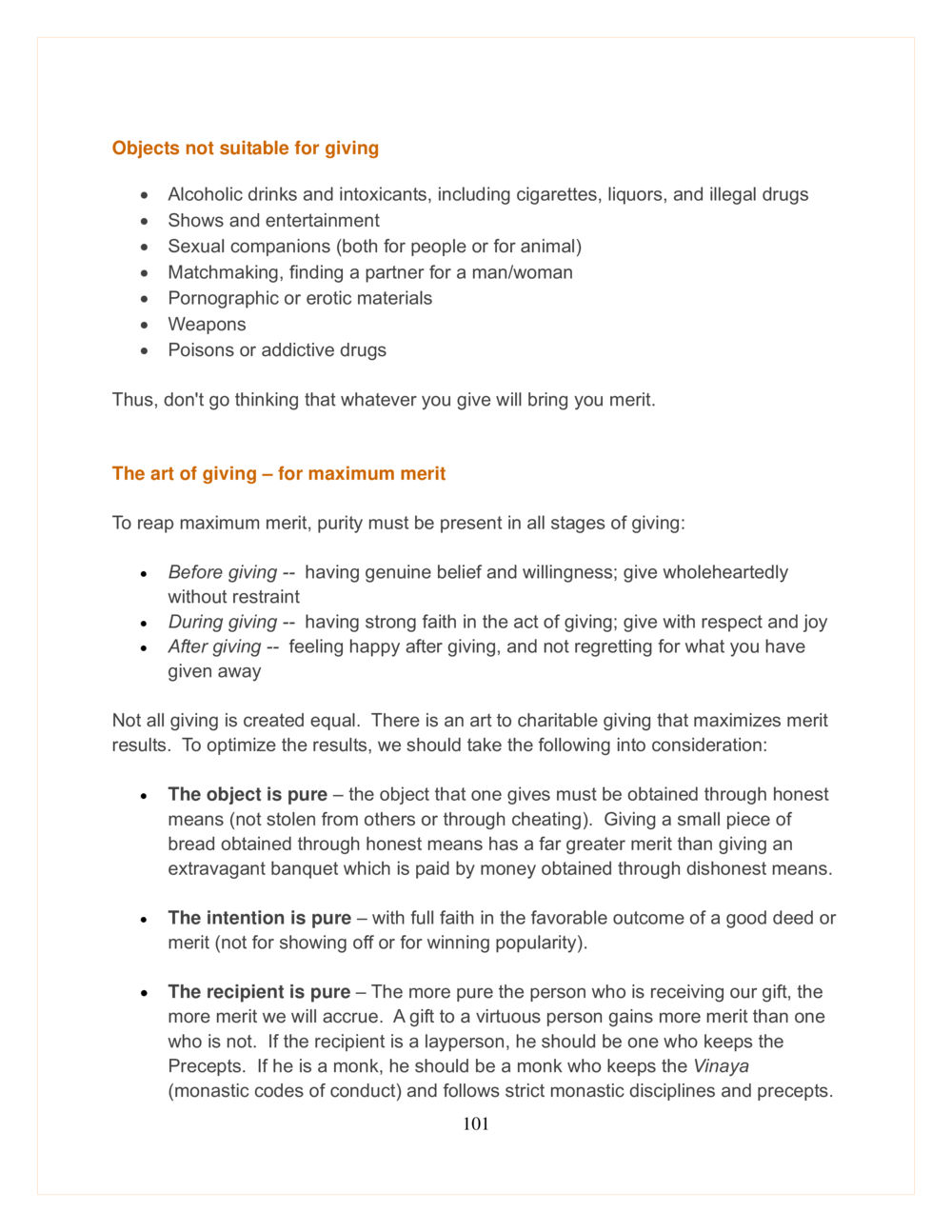The Art of Charitable Giving for Maximum Merit : หน้า 101/115
DMC Translor’s handbook : หน้า 101/115 Explore the principles of effective charitable giving that maximizes merit, highlighting the importance of purity in intention, object, and recipient.
0 ครั้ง

สรุปเนื้อหา
การให้จะต้องมีความบริสุทธิ์ในทุกขั้นตอนเพื่อให้ได้มาซึ่งบุญสูงสุด สิ่งที่ไม่ควรมอบ ได้แก่ เครื่องดื่มแอลกอฮอล์ สื่อลามก อาวุธ และสารพิษ การให้ที่มีความบริสุทธิ์ต้องมีความเชื่อมั่นที่แท้จริง มีความยินดีใจในขณะให้ และรู้สึกมีความสุขหลังจากให้ นอกจากนี้วัตถุที่ให้ต้องได้มาโดยสุจริต และต้องมีเจตนาที่ดี ความบริสุทธิ์ของผู้รับก็มีความสำคัญต่อการได้รับบุญที่มากขึ้น การให้กิ่งไม้ที่ได้มาอย่างสุจริตย่อมมีคุณค่ามากกว่าการให้แท่งทองคำที่ได้มาจากการโกง
หัวข้อประเด็น
- การให้เพื่อบุญ
- ความบริสุทธิ์ของการให้
- ความตั้งใจและเจตนา
- ผู้รับบริสุทธิ์
ข้อความต้นฉบับในหน้า
Objects not suitable for giving
• Alcoholic drinks and intoxicants, including cigarettes, liquors, and illegal drugs
• Shows and entertainment
• Sexual companions (both for people or for animal)
• Matchmaking, finding a partner for a man/woman
• Pornographic or erotic materials
• Weapons
• Poisons or addictive drugs
Thus, don't go thinking that whatever you give will bring you merit.
The art of giving – for maximum merit
To reap maximum merit, purity must be present in all stages of giving:
• Before giving -- having genuine belief and willingness; give wholeheartedly without restraint
• During giving -- having strong faith in the act of giving; give with respect and joy
• After giving -- feeling happy after giving, and not regretting for what you have given away
Not all giving is created equal. There is an art to charitable giving that maximizes merit results. To optimize the results, we should take the following into consideration:
• The object is pure -- the object that one gives must be obtained through honest means (not stolen from others or through cheating). Giving a small piece of bread obtained through honest means has a far greater merit than giving an extravagant banquet which is paid by money obtained through dishonest means.
• The intention is pure -- with full faith in the favorable outcome of a good deed or merit (not for showing off or for winning popularity).
• The recipient is pure -- The more pure the person who is receiving our gift, the more merit we will accrue. A gift to a virtuous person gains more merit than one who is not. If the recipient is a layperson, he should be one who keeps the Precepts. If he is a monk, he should be a monk who keeps the Vinaya (monastic codes of conduct) and follows strict monastic disciplines and precepts.
หน้าหนังสือทั้งหมด
หนังสือที่เกี่ยวข้อง
Load More



















































































































